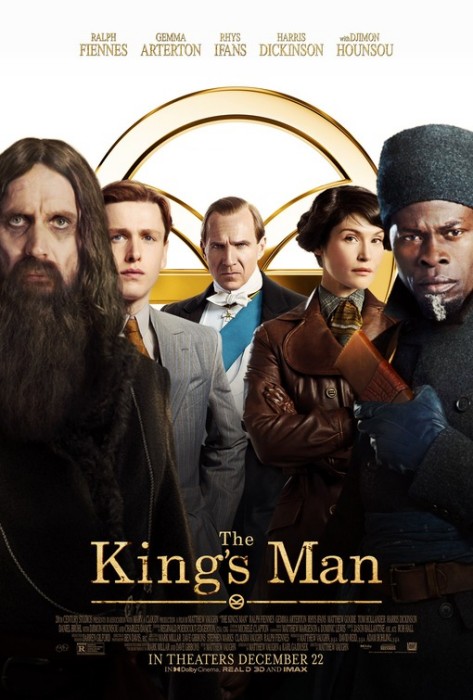The King's Man
 |
The King's Man
Theatrical Release: December 22, 2021 Running Time: 131 Minutes Rating: R Director: Matthew Vaughn Writers: Matthew Vaughn (story & screenplay), Karl Gajdusek (screenplay); Mark Millar, Dave Gibbons (comic books) Cast: Ralph Fiennes (Orlando Oxford), Gemma Arterton (Polly), Rhys Ifans (Grigori Rasputin), Matthew Goode (Morton), Tom Hollander (King George, Kaiser Wilhelm), Harris Dickinson (Conrad Oxford), Djimon Hounsou (Shola), Charles Dance (Kitchener), Aaron Taylor-Johnson (Archie Reid), Stanley Tucci (United States Ambassador), Alexandra Maria Lara (Emily Oxford) |
Following two lucrative and generally well-received movies, 20th Century Studios has oddly opted to take its Kingsman franchise in a different direction the third time out. The King's Man is a prequel no one was clamoring for. It loses the likes of Taron Egerton and Colin Firth in favor of an early 20th century origin story with a cast led by Ralph Fiennes.
The approach seems more befitting a series with palpable fatigue and the results are underwhelming. King's Man feels like an off-brand spin-off, even though it hails from Matthew Vaughn, the director of the two prior Kingsman movies, and like them is adapted from the Marvel comic book line by Mark Millar and Dave Gibbons.
Fiennes, who also serves as an executive producer, stars as aristocat Orlando Oxford, whose wife is killed by snipers during a 1902 visit to a South African concentration camp. The experience is harrowing both for Orlando and his young son Conrad, who grows up eager to enlist in the British Army as global unrest spreads.
Conrad and Orlando are on the scene for an assassination attempt on Orlando's friend Archduke Franz Ferdinand and though it is thwarted, eventually this powderkeg incident occurs and sparks World War I. Orlando and his secret group of allies, which include his maid Polly (Gemma Arterton) and his servant Shola (Djimon Hounsou), find themselves in battle with a more nefarious covert collective which includes the Russian mystic Rasputin (Rhys Ifans) and is led by the mystery bald man known as The Shepherd.
It is strange for the series to suddenly incorporate world history and a period setting as key features. The plot barely takes any efforts to link Arthurian legend to the Kingsmen's contemporary status. Even the style that has to date distinguished the line -- meeting in a tailor's shop and the mantra "manners maketh the man" -- is virtually nonexistent here. It's as if Vaughn and company are not at all interested in holding on to the fanbase they have established.
The signature primary ingredients of over-the-top-action and comedy also seem a tad subdued here. There are a few diverting sequences, most notably Oliver's cartoonish battle of wits (and weapons) with the nefarious Rasputin. But most of the time, the viewer is expected to be seriously invested in a conflict whose parties have not yet endeared themselves and whose specifics fail to grip.
King's Man feels like a distinct step backward for the franchise and for Vaughn, who ten years since breathing welcome new life into a fatigued line with X-Men: First Class has not evolved or ever tried to apply his unmistakable flair to something outside his comfort zone. A cringeworthy mid-credits scene here introduces Adolf Hitler, but supposedly the next installment will return us to the present day for what is intended to conclude Eggsy and Harry's storyline.
About the only positive takeaway from this prequel's existence is that it confirms that 20th Century Studios will still make R-rated movies, something parent company Disney abandoned years ago. King's Man may not be a ringing endorsement for edgier fare in the House of Mouse's production slate, but demographical variety of any kind is welcome at a studio with an alarming control over today's mainstream cinematic output.
|
Related Reviews:
DVDizzy.com | DVD and Blu-ray Reviews | Search This Site
DVDizzy.com Top Stories:
Now in Theaters: Spider-Man: No Way Home • King Richard • The Tragedy of Macbeth • West Side Story
Directed by Matthew Vaughn: Kingsman: The Golden Circle • X-Men: First Class • Kick-Ass • Stardust
Ralph Fiennes: The Grand Budapest Hotel
Text copyright 2022 DVDizzy.com. Images copyright 2021 Disney and 20th Century Studios.
Unauthorized reproduction prohibited.